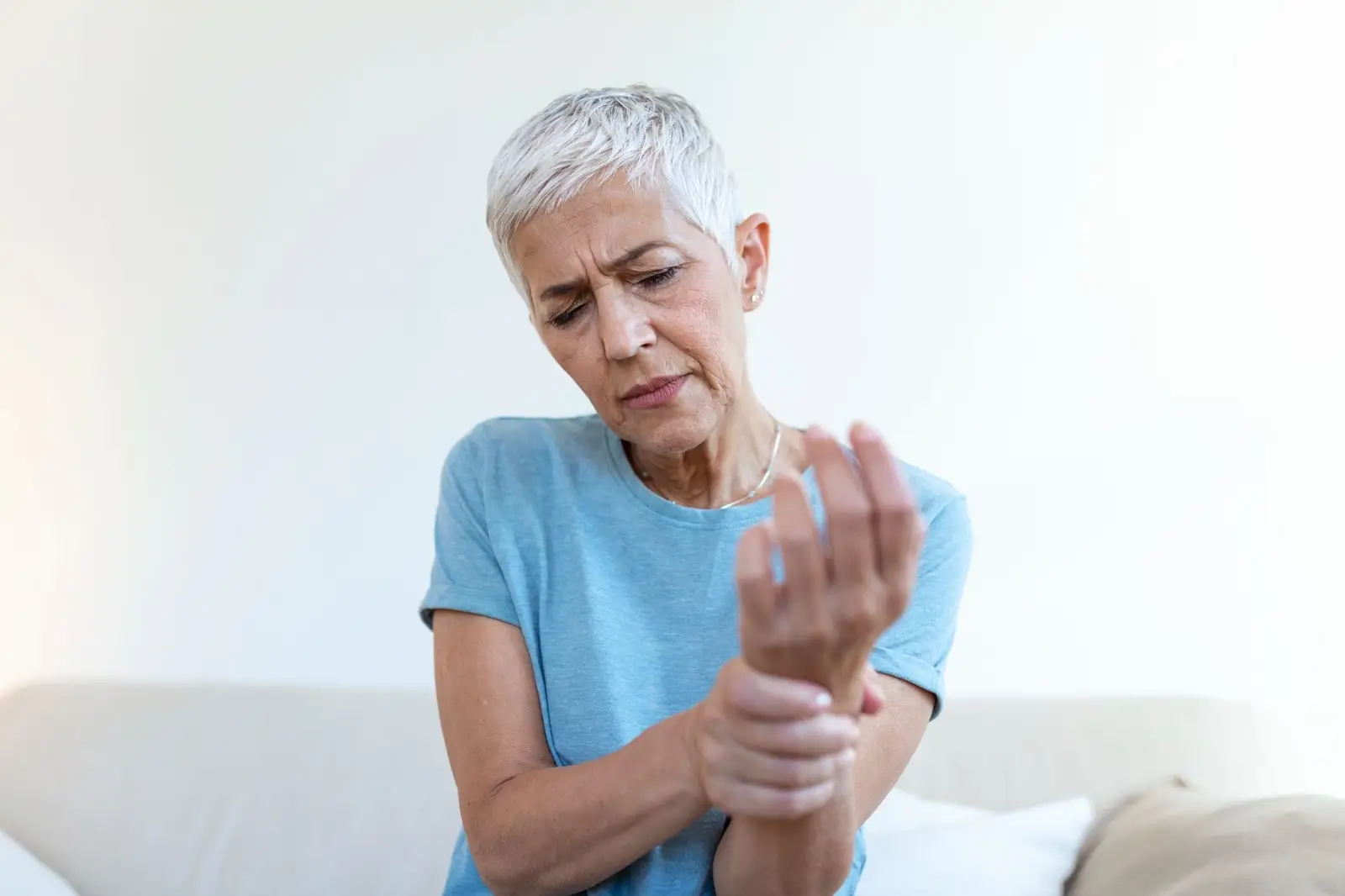Only for Licensed Professionals
Only for Licensed Professionals
.webp)
Evenity Side Effects – A Complete List
David Fuller
Last Updated On: June 24, 2025
A recent review highlights that while romosozumab (Evenity) is effective in increasing bone mineral density, it also carries potential cardiovascular risks, including myocardial infarction and stroke, particularly in postmenopausal women with osteoporosis. Common side effects such as joint pain, headaches, and injection site reactions have been reported in multiple clinical trials, raising important concerns for both patients and clinicians.
As a relatively new treatment option for osteoporosis, Evenity has sparked interest in its complete side effect profile. Understanding the full range of potential side effects—both mild and severe—is crucial for patients considering this therapy and for healthcare providers making informed treatment decisions.
In this article, we will explore Evenity’s side effects, providing a detailed overview to help patients and practitioners use it safely and effectively.
Key Takeaways
- Evenity is a powerful treatment for increasing bone mineral density and reducing fracture risk, particularly in postmenopausal women with osteoporosis, but it comes with potential side effects.
- Evenity affects bone metabolism and cardiovascular function, with side effects often appearing within days for mild symptoms and months for more serious risks.
- Common mild side effects include joint pain, headaches, injection site reactions, muscle spasms, and fatigue, most of which are transient and manageable with basic care.
- Serious risks include cardiovascular events (heart attack, stroke), hypocalcemia (low blood calcium), osteonecrosis of the jaw (ONJ), and atypical femoral fractures. These require careful patient screening and monitoring.
- Pre-treatment screening should include cardiovascular history, calcium levels, renal function, and dental exams to assess risk factors, especially for more severe side effects.
- Patient education is critical to ensure awareness of symptoms that require urgent attention, such as chest pain, groin pain, or visual disturbances, and prompt action can help mitigate risks.
About: Operating since 2016, Med Supply Solutions is known for being one of the industry’s top and trusted suppliers of cosmetic and viscosupplementation products. If you’re interested in purchasing Evenity online, please contact our sales department for more information.

Common Side Effects of Evenity: What to Expect in Practice

While Evenity is a powerful treatment option for building bone density and reducing fracture risk in postmenopausal women with osteoporosis, it does come with a range of potential side effects. Many patients experience mild to moderate symptoms, particularly after their initial injections. These effects are often short-lived and manageable with basic supportive care, making it important to set realistic expectations for both patients and healthcare providers.
- Joint Pain (Arthralgia) and Headaches: These symptoms are often linked to the body’s natural response to bone remodeling initiated by the drug. Joint discomfort is typically mild but can feel like general stiffness or soreness, especially in the knees, hips, or lower back.
- Injection Site Reactions (Redness, Localized Swelling, Itching, or Tenderness): These reactions typically occur within a few hours after the injection and resolve within 2 to 3 days. Applying a cool compress and keeping the area clean can help alleviate discomfort and reduce inflammation.
- Muscle Spasms, Neck Pain, Peripheral Edema: Common side effects, especially in the first few months of treatment. These symptoms are part of the body’s adjustment to the anabolic effects of Evenity, typically fading on their own without intervention.
- Fatigue, Insomnia, and Tingling in the Limbs: Have also been observed in some patients, particularly after the second or third dose. These neurological symptoms may be related to metabolic shifts or calcium regulation. They are generally transient and improve with proper sleep hygiene, hydration, and stress reduction techniques.
Although these side effects may be concerning at first, they often subside as the body adjusts to the medication. Patients can manage most of these symptoms at home with rest, over-the-counter pain relievers, and hydration. If symptoms persist, healthcare providers may consider adjustments to dose timing or other supportive treatments.
Serious Risks of Evenity: Cardiovascular Events and Hypocalcemia
While Evenity offers significant benefits in bone formation and fracture prevention, it also carries essential safety risks. These risks, though rare, can have serious clinical consequences if not properly addressed. Proper patient screening, timely lab monitoring, and awareness of red-flag symptoms are essential to minimize these complications.
- Major Adverse Cardiac Events (MACE): Clinical trials have shown that Evenity can increase the risk of cardiovascular events such as heart attack, stroke, and cardiovascular death compared to other osteoporosis treatments like alendronate. The exact mechanism remains under investigation, but potential vascular effects may contribute to these risks.
- Hypocalcemia (low blood calcium): Evenity can disrupt calcium balance, especially in patients with pre-existing deficiencies, renal impairment, or malabsorption conditions. Serum calcium levels should be corrected before starting treatment, and patients should maintain adequate intake of calcium and vitamin D throughout therapy.
- Osteonecrosis of the Jaw (ONJ): Although primarily associated with intravenous bisphosphonates or denosumab, ONJ has been reported in some Evenity patients. The risk is higher in patients with poor oral hygiene or a history of recent dental procedures.
- Atypical Femoral Fractures: Patients receiving long-term antiresorptive or anabolic agents like Evenity may develop stress fractures in the thigh bone, often presenting as unexplained groin or thigh pain. These fractures can occur with minimal trauma.
- Severe Allergic Reactions: Though rare, anaphylaxis and hypersensitivity reactions to Evenity can occur. Symptoms include facial swelling, hives, difficulty breathing, or throat tightness.
These serious adverse effects are uncommon but highlight the importance of individualized treatment planning. By carefully selecting the right candidate for Evenity and recognizing side effects early, healthcare providers can ensure that the benefits of therapy outweigh the risks.
Timing, Onset, and Monitoring of Evenity Side Effects
Monitoring the timing and onset of Evenity side effects is critical for optimizing treatment outcomes and ensuring patient safety. As romosozumab-aqqg (the Evenity generic name) affects both bone metabolism and cardiovascular function, understanding when side effects might appear allows clinicians to intervene early and appropriately.
Most mild side effects, such as joint pain or fatigue, tend to appear within days of the first injection. Serious risks—like cardiovascular events, hypocalcemia, or atypical fractures—are more commonly linked to cumulative exposure over time and may develop after several months of treatment. Therefore, side effects can vary depending on the patient’s individual risk and the duration of their therapy.
To mitigate risks, clinicians should initiate thorough baseline assessments, including checking serum calcium levels, reviewing cardiovascular history, evaluating renal function, and conducting dental exams. Regular monitoring continues throughout the 12-month treatment cycle. If patients report symptoms such as chest pain, sudden weakness, persistent discomfort in the thigh or jaw, or changes in vision, immediate evaluation is necessary to rule out more serious complications.
Managing and Preventing Evenity Side Effects in Patients

Effective management and prevention of Evenity side effects begin with proper patient selection. The drug is contraindicated in individuals with a history of myocardial infarction, stroke, or pre-existing hypocalcemia. Pre-treatment screening should include a detailed cardiovascular history, baseline calcium levels, renal function, and a dental examination to assess the risk of osteonecrosis of the jaw.
Along with screening, careful dose management is essential. Patients should maintain adequate levels of calcium and vitamin D throughout treatment. In cases where calcium levels drop or signs of intolerance appear, dose adjustments or temporary discontinuation may be necessary to prevent symptoms such as the following:
- Muscle spasms
- Paresthesia
- Cardiac irregularities
Patient education is equally important. Clinicians should ensure that patients are aware of the symptoms that require urgent attention. These include unexplained joint pain, jaw discomfort, thigh or groin pain, chest tightness, or visual disturbances. Coordinated care with primary providers, dentists, and cardiologists can provide a more holistic and safer treatment approach, particularly for patients at higher risk.
Conclusion
Evenity offers significant anabolic benefits for bone density and fracture prevention. However, it comes with risks, such as cardiovascular events and hypocalcemia. While most side effects are manageable, serious complications require careful patient selection, regular monitoring, and adherence to safety protocols.
By making informed decisions and providing integrated care, Evenity can offer life-changing benefits in osteoporosis treatment while minimizing risks.
FAQs
1. What are the most common side effects of Evenity?
Patients frequently report joint pain, headache, injection site swelling, muscle spasms, fatigue, and insomnia.
2. Why does Evenity carry a cardiovascular warning?
Clinical trials showed an increased risk of heart attack, stroke, and cardiovascular death compared to alendronate.
3. How can patients prevent hypocalcemia during therapy?
Correct any low calcium levels before starting and maintain daily calcium and vitamin D supplementation with periodic lab monitoring.
4. What serious bone-related risks should patients monitor?
Be alert for jaw pain (ONJ) or thigh/groin pain (stress fractures). Notify providers immediately for evaluation and imaging if needed.
References
Miller SA, St Onge EL, Whalen KL. Romosozumab: A Novel Agent in the Treatment for Postmenopausal Osteoporosis. J Pharm Technol. 2021;37(1):45-52. doi:10.1177/8755122520967632
Romosozumab: Uses, interactions, mechanism of action. DrugBank. https://go.drugbank.com/drugs/DB11866
Langdahl B, Hofbauer LC, Ferrari S, et al. Romosozumab efficacy and safety in European patients enrolled in the FRAME trial. Osteoporos Int. 2022;33(12):2527-2536. doi:10.1007/s00198-022-06544-2
Products
Cart
Log In
Newsletter
Subscribe for exclusive offers and updates on new arrivals
Share feedback at:
Working Hours
MON - SUN 9AM to 6PM EST
The Most Popular Brands
Med Supply Solutions
Support
Secure checkout is guaranteed with full adherence to PCI DSS payment standards.
Products listed here are guaranteed authentic and manufacturer-sourced.
Pay easily with trusted providers


*Google and Apple Pay are currently only available via a direct link provided by your account manager.
Copyright 2026. Med Supply Solutions